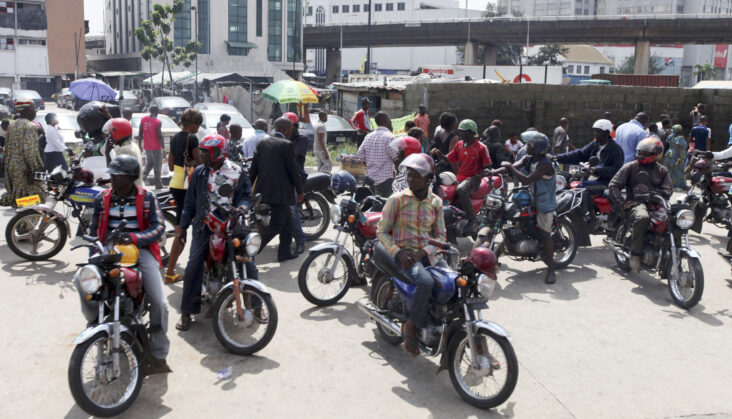[ad_1]
The Lagos State government banned commercial motorcycle taxis (okadas) on 1 June from the Apapa, Eti Osa, Ikeja, Lagos Island, Surulere and Lagos Mainland local government areas.
Since then, the government has crushed over 2,000 impounded okadas that it said flouted the ban.
In response, okada riders protested against the seizure of their motorcycles by the Lagos task force team in Idi-Araba, saying their vehicles were not in the banned zone.
The government responded with tear gas and gunfire, forcing shop owners around to close up early.
Police spokesperson Benjamin Hundeyin said: “Some lawless motorcycle operators were trying to cause trouble after their motorcycles were impounded. Our men are fully on the ground. CP Abiodun Alabi personally coordinated our response.”
Governor Sanwo-Olu, on his part, reminded us that: “There has been a law banning okada operations in the state since 2018, the current ban did not invalidate the previous one. So, the law is still in force.”
What’s new?
The new (or reiterated) ban came as a result of the lynching of 38-year-old sound engineer Sunday David in Lekki. Believed to have been killed by okada drivers over a disagreement about dares, the community outrage pushed the state government to act.
According to Sanwo-Olu: “Before, we only arrested the okada riders, but now we arrest both the okada and their passengers to discourage them.”
The article continues below

Free download
Get your free PDF: Top 200 banks 2019
The race to transform
Complete the form and download, for free, the highlights from The Africa Report’s Exclusive Ranking of Africa’s top 200 banks from last year. Get your free PDF by completing the following form
The Commissioner for Transportation, Fredrick Olainde announced the Ministry of Transportation’s inauguration of an “Anti-Okada Squad … in line with the commencement of the ban of motorcycle operations within LGs and the respective LCDAs under them.”
Northern backlash
Lagos State seized and destroyed over 7,500 bikes within three days of announcing the ban. The Coalition of Northern Groups (CNG) has said that it believes the ban targets northerners, who are known to drive okadas in southern states, with spokesperson Abdul-Azeez Suleiman calling it “rash, irrational, insensitive, wicked.”
According to him, the CNG has noted: “that of recent, state governments in the south have resorted to imposing and enforcing controversial, unfriendly and damaging legislation that effectively curtail the right to freedom of movement of the northern people living in their midst.”
Understand Africa’s tomorrow… today
We believe that Africa is poorly represented, and badly under-estimated. Beyond the vast opportunity manifest in African markets, we highlight people who make a difference; leaders turning the tide, youth driving change, and an indefatigable business community. That is what we believe will change the continent, and that is what we report on. With hard-hitting investigations, innovative analysis and deep dives into countries and sectors, The Africa Report delivers the insight you need.
[ad_2]
Source link
